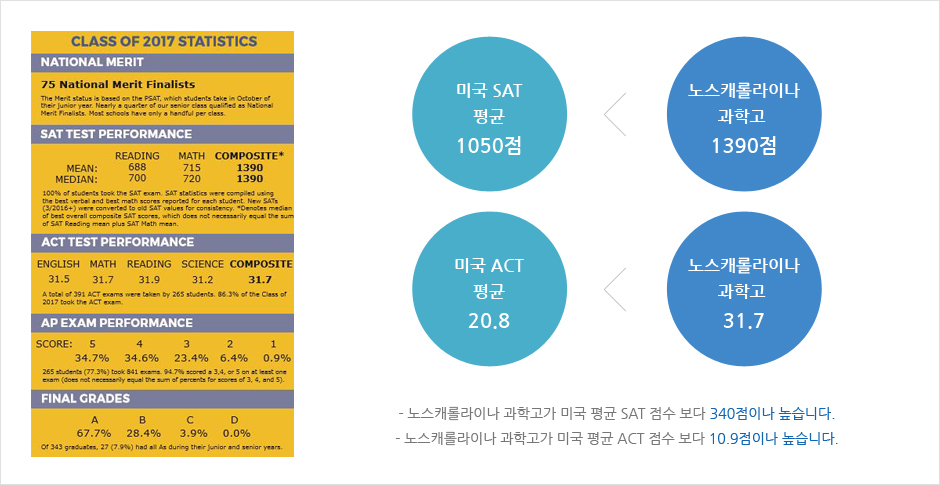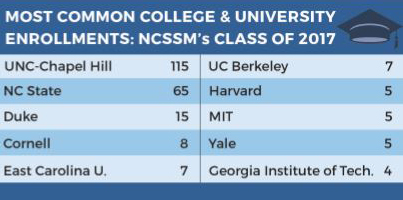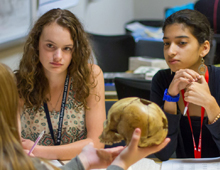
영어캠프
 영어캠프 > 미국캠프 > 노스캐롤라이나 - 과학고 캠프
영어캠프 > 미국캠프 > 노스캐롤라이나 - 과학고 캠프
노스캐롤라이나 - 과학고 캠프
노스캐롤라이나 과학고는 2만 500백개의 공립 학교 중에서
12위에 랭크 된 최고의 명문 과학 고등학교 입니다.
소개
노스캐롤라이나 과학고는 Durham 지역에 위치하고 있으며, 이 지역에는 최고의 명문 대학으로 꼽히는 듀크 대학 과 UNC at Chapel-Hill 이 위치하고 있습니다. 노스캘로라이나 과학고는 11~12학년 2년제로 이루어진 기숙사가 있는 과학고 입니다. 학생은 총 680명이 재학 하고 있습니다. 미국내 최고의 과학고 답게 훌륭한 교사진, 시설, 커리큘럼을 가지고 있습니다.
미국 평균 vs 노스캐롤라이나 과학고

2017년 노스캐롤라이나 과학고 대학 입학 현황
 |
340명의 졸업생 중 115명이 UNC-Chapel Hill 에 입학 1/3 학생이 UNC-Chapel Hill 입학 UNC- Chapel Hill 은 전미 랭킹 30위 에 준 아이비급 학교 NC State 65명(80위) Duke 15명(8위) UC Berkley 7명(22위) Harvard 5명(2위) MIT 5명(공동 3위) Yale 5명(공동 3위) 조지아 공대 4명(35위) |
애임하이교육만의 특별한 노스캐롤라이나 과학고 여름 방학 캠프!
미국 명문 과학고에서 미국 학생, 여러 나라의 학생들과 어울려 생활할 수 있다!
미국 전역에서 300명 이상 참가하는 미국 안에서 인정 받는 과학고 캠프
박사 과정을 이수한 대학교 교수급 교사가 가르치는 캠프 과정
미국 과학고 과정을 통하여 선진 교육을 체험할 수 있다!
다양한 액티비티 활동으로 미국 학생들과 교류하며 문화를 경험할 수 있다!
프로그램 개요
| 구분 | 내용 |
|---|---|
| 기간 | 2019년 06월 07일(금) ~ 2019년 6월 28일(금): 3주 |
| 학교 | 노스캐롤라이나 과학고 |
| 대상 | 초6 ~ 중2 영어가 어느 정도 가능하고 과학, 수학에 관심이 많은 학생 |
| 모집기간 | 1차 접수 마감일: 1월 1일 2차 접수 마감일: 2월 1일 3차 접수 마감일: 3월 1일 *학생 숫자가 다 찰 경우 조기 마감이 가능합니다. |
| 숙박 | 노스캐롤라이나 과학고 기숙사 |
| 지원 필요 서류 | 지원서 작성, 학교 성적 |
| 참가비 | $8,500 |
| 포함 내역 | 학비, 기숙사 비용, 주말 및 평일 액티비티 비용, 가디언 관리 비용, 공항 픽업 라이드 |
캠프 수업 내용
매주 1개의 수업을 선택해서 듣게 됩니다.
3주 동안 총 3개의 다른 수업 과정을 선택 할 수 있습니다.
선택 하실 수 있는 수업은 아래와 같습니다.
[1st Week Curriculums] 3개의 수업 중 한 개를 선택해서 듣습니다.
| 1. Epidemiology: Identifying and Exploring Disease (전염병학) | |
|---|---|
| Dates and locations | June 9 - 14, 2019 in Durham, NC |
| Grades eligible | Rising 7th, 8th, and 9th graders |
| Description | So long as humans have existed on this planet, microbes have coexisted with us. They’ve lived in our bodies and thrived in the environment, posing a silent and constant threat. They’ve caused fevers and panic, helped with digestion and immunity. In this introductory course in human microbial disease, students will be introduced to the impact that various microbes have had in our lives. Students will learn the principles and methods of disease investigation: investigating patterns of illness in populations, identifying infectious microbes by visual assessment, mode of infection, and symptoms. |
| Goal | By the end of course, students will be able to identify the characteristics of various pathogens and infectious agents, be able to explain how diseases spread, and will construct models, create presentations, and collaborate on projects related to epidemiology. |
| Instructors | Dr. Amanda Martyn, Instructor of Biology and Candice Chambers, Instructor of Forensic Science |
| 2. Creative Digital Fabrication (디지털 제조) | |
| Dates and locations | June 9 - 14, 2019 in Durham, NC July 14 - 19, 2019 in Durham, NC July 21 - 26, 2019 in Durham, NC |
| Grades eligible | Rising 7th, 8th, and 9th graders |
| Description | This class is a comprehensive introduction to digital fabrication technology using 3D printing and laser cutting. Using Autodesk TinkerCAD, we will create virtual 3D models and produce them in NCSSM’s FabLab and will design laser cut objects using Inkscape. The course will emphasize creativity, problem solving, and the practical applications of these technologies. Students will tackle design challenges and participate in discussions on the use of 3D technologies throughout industry, Fine Art, Engineering, and beyond. Questions we will explore include: What are the advantages of prototyping design on 3D printers and laser cutters? How can we utilize this technology in unexpected ways? How does the possibility of modular production affect design? |
| Goals | Students will learn to use Autodesk TinkerCAD and Inkscape, create custom virtual objects, and fabricate 3D objects using the FabLab machines. |
| Requirements | Students should have basic computer literacy, and Windows familiarity is most useful. |
| Instructors | Bec Conrad, FabLab manager and instructor of engineering & Julia Gartrell, instructor of Fine Art |
| 3. Investigative Science: Finding Clues and Solving Crimes (탐구 과학: 단서 찾기 및 범죄 해결) | |
| Dates and locations | June 9 - 14, 2019 in Durham, NC |
| Grades eligible | Rising 7th, 8th and 9th graders |
| Description | This course is an introduction to crime scene investigations and the applications of a number of scientific disciplines employed by law enforcement to solve crimes. The course will focus on reconstruction, laboratory analysis and procedures used in criminalistics. Topics covered will include the crime scene search, forensic impression analysis, bloodstain pattern analysis, forensic biology and trace evidence. |
| Goal | Students will learn to successfully document and identify impression evidence, to process a crime scene and to use mathematical principles to reconstruct a crime scene from bloodstain patterns, and students will interpret and analyze scientific information using the scientific method and deductive reasoning. Finally, participants will compile a lab notebook documenting their experiments and analysis. |
| Instructors | Jason Howe, Durham County detective and instructor of forensic science |
[2nd Week Curriculums] 2개의 수업 중 한 개를 선택해서 듣습니다.
| 1. Math Puzzles and Games (수학 퍼즐 과 게임) | |
|---|---|
| Dates and locations | June 16 - 21, 2019 in Durham, NC. |
| Grades eligible | Rising 7th, 8th, and 9th graders |
| Description | In this course we will explore new math puzzles and games and revisit classics like the Rubik’s Cube, chess, and dominoes. We will develop strategies to solve logic and sudoku-like puzzles. Students will also challenge each other or work collaboratively while playing various mathematical games (e.g. Ticket to Ride, Pandemic, Terraforming Mars). Students are encouraged to introduce their favorite puzzles/games to the class for further exploration. This course will provide a fun and stimulating environment for students to directly engage in mathematical problem solving in a collaborative environment. |
| Goals | Students will actively engage in mathematical problem solving by collaboratively exploring the facets of each puzzle or game and research strategies and solutions. |
| Instructors | Ryan Pietropaolo, instructor of mathematics |
| 2. Genetics Lab (유전학 연구) | |
| Dates and locations | June 16 - 21, 2019 in Durham, NC |
| Grades eligible | Rising 7th, 8th, and 9th graders |
| Description | Genetics is a hot topic in everyday life. Conversations often stem around why your hair is brown while someone else's is blonde, or why you are tall and your best friend is short. In this program, students will explore the genetic components that make up who we are and why each individual is unique, while applying their knowledge to simulated and real life scenarios. Students will also be introduced to how our understanding of gene mutation has led to the molecular evolution of a species, how genetic manipulation is an invaluable component of modern day biotechnology research and application, to current gene therapy successes, and to the field of genetic counseling. |
| Requirement | 6th grade science. |
| Instructors | Dr. Amanda Martyn, instructor of biology and Carla Coste Sanchez, instructor of science. |
[3rd Week Curriculums] 2개의 수업 중 한 개를 선택해서 듣습니다.
| 1. Math to the Rescue: Solving Big Problems with New Math (신수학으로 어려운 문제 풀기) | |
|---|---|
| Dates and locations | June 9 - 14, 2019 in Brevard, NC. June 23 - 28, 2019 in Durham, NC. |
| Grades eligible | Rising 7th, 8th and 9th graders |
| Description | This course is designed to expose talented young math students to the beauty and power of mathematics as a problem solving instrument. Throughout the week, students will explore a wide range of ideas from many different branches of mathematics, including taxicab geometry, graph theory, combinatorics, probability, and social choice theory. Students will actively work in small teams to use the new mathematics they learn to solve problems that face citizens and professionals from a variety of sectors of our society. A strong emphasis will be placed on using mathematics to model real-world situations. Each day, students will be presented with a big problem to solve. After discussing students' initial thoughts and solutions, they will be introduced to fundamental concepts in a new branch of mathematics (one per day) and shown how those ideas can be used to solve the big problem. |
| Goal | The course's goal is for students to actively experience mathematics as a creative and investigative endeavor. |
| Requirements | It is highly recommended that students will have successfully completed either NC Math 1 or Algebra 1 before beginning this course. However, students with very strong mathematical abilities who have only studied pre-algebra topics may also be prepared for the course. |
| Instructor | Forrest Hinton, instructor of mathematics. |
| 2. Breaking Reality: How Games Might Change the World (현실을 깨다: 게임이 세계를 바꿀 수 있을 것이다) | |
| Dates and locations | June 23 - 28, 2019 in Durham, NC |
| Grades eligible | Rising 7th, 8th and 9th graders |
| Description | Who doesn't love games? This course will look at more than why games are fun (but we will talk about fun). We will examine the history of games, the social value of games, and how games have changed the economy and schools. We will explore what makes a good game, learn about current trends in game design, and we will built and playtest prototype tabletop games. We will even think about how designing the right games might be a step towards solving real world problems. We will culminate the week by designing and play-testing original games designed to change the world. This class will be serious fun. |
| Goals | We will learn about current game trends and experience a wide variety of games that will stretch students intellectually and socially. Then we will analyze some games and ultimately design and playtest original tabletop games. |
| Instructors | Jason Lineberger, instructor of technology. |
Week Schedule
상기 일정은 학교와 현지 일정에 따라서 변경될 수 있습니다.
Monday - Thursday
8:00 - 9:00 a.m. Breakfast
8:45 - 9:00 a.m. Morning mindfulness
9:00 - 11:30 a.m. Class time
11:30 a.m. - 12:30 p.m. Lunch
12:30 - 1:30 p.m. Afternoon activity
1:30 - 4:30 p.m. Class time
4:30 - 6:00 p.m. Dinner
6:00 - 9:30 p.m. Evening activities
9:30 p.m. Check time! Students must be in their residence halls
11:00 p.m. Lights out
Friday
8:00 - 9:00 a.m. Breakfast
9:00 - 11:30 a.m. Class time
11:30 a.m. - 12:30 p.m. Lunch and packing
12:30 - 2:00 p.m. Presentations to family and friends and check-out
가디언 선생님 픽업
호텔 숙식
Saturday
액티비티 (매주 다름)
Sunday
1:30 - 3:30 p.m. Students arrive / Registration / IT Desk Support
4:00 - 5:30 p.m. Campus tour and Student Life programming
5:30 - 6:30 p.m. Dinner
6:30 p.m. Welcome session
8:00 p.m. Ice cream social
전체 일정
| 월요일 | 화요일 | 수요일 | 목요일 | 금요일 | 토요일 | 일요일 |
|---|---|---|---|---|---|---|
| 6월 7일 | 6월 8일 | 6월 9일 | ||||
| 미국 도착 | 관광 | 관광 학교 기숙사 |
||||
| 6월 10일 | 6월 11일 | 6월 12일 | 6월 13일 | 6월 14일 | 6월 15일 | 6월 16일 |
| 수업 | 수업 | 수업 | 수업 | 수업 퇴소 |
액티비티 | 학교 기숙사 입소 |
| 6월 17일 | 6월 18일 | 6월 19일 | 6월 20일 | 6월 21일 | 6월 22일 | 6월 23일 |
| 수업 | 수업 | 수업 | 수업 | 수업 퇴소 |
액티비티 | 학교 기숙사 입소 |
| 6월 24일 | 6월 25일 | 6월 26일 | 6월 27일 | 6월 28일 | 6월 29일 | 6월 30일 |
| 수업 | 수업 | 수업 | 수업 | 한국으로 출발 |

 회사소개
회사소개 로그인
로그인 회원가입
회원가입















